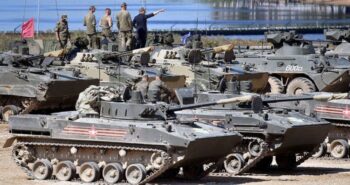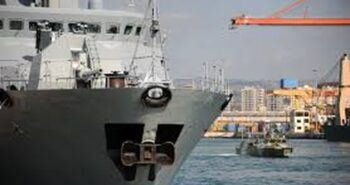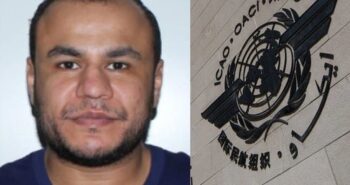By Jalel Harchaoui
 Russia has been doing well in Libya — and it likes the fact that few seem to notice it.
Russia has been doing well in Libya — and it likes the fact that few seem to notice it.
PART (II)
Financial Interference
Since May 2016, the Russian printing company Goznak has manufactured more than 14 billion dinars’ worth of banknotes (then the equivalent of more than $10 billion) for the Libyan National Army without consulting the country’s internationally recognized central bank.
A year and a half earlier, the central bank in Tripoli had cut off its branch in eastern Libya from the nation’s clearing system. But the rogue injections of Russian paper, which enabled Haftar to triple Libyan National Army personnel salaries, bolstered the armed coalition’s independence from the Government of National Accord during the key year that was 2016, and helped keep it afloat.
Such Russian activity isn’t purely commercial: Goznak is a state-owned enterprise, which makes it one of the Kremlin’s instruments of leverage over eastern Libya.
The second half of 2020 has witnessed a greater-than-usual scarcity of dinar banknotes in eastern Libya, or Cyrenaica, while indicators point to a likely further worsening of the liquidity crisis in coming months.
One cannot attribute this development solely to the firmer manner in which the United States has opposed the Russian deliveries of dinars lately.
It also reflects deliberate self-restraint by Moscow at a time when the Russian state is interested in seeing the United Nations succeed in mending Libya’s fractured financial system. Since May 2020, there has been a common desire in both Ankara and Moscow to let diplomacy help reboot the Libyan economy.
Moscow slashed the inflow of Russian-printed dinars, even if that has meant putting Haftar in financial straits for several months. Letting the United Nations make headway with its banking-unification process is more important to Moscow because it will eventually enable it to do business in Libya.
This is just one among many reminders of how circumstantial Russia’s support for the Libyan commander is. After the country’s financial system is overhauled, Moscow may resume using this tool, and others, to influence and shape the leadership in eastern Libya.
The Wagner Group and Lethal Force
More important than economic statecraft has been Russia’s military intervention, which began in September 2019 and has been carried out mainly through private military companies. Such entities probably debuted in Cyrenaica as early as in 2016, but long stayed confined to a non-combat role.
By 2017, the international press was able to establish that the armed men of a Russian company called RSB Group provided security and de-mining services for Haftar’s forces. Russian forces also helped them maintain Soviet-era weapons, including Libyan-piloted warplanes.
During the first half of 2018, once the foreign military intelligence agency of Russia’s Armed Forces had conducted a preparatory mission in eastern Libya, the Wagner Group — founded in 2014 by Putin-linked businessman Yevgeny Prigozhin and former intelligence officer Dmitry Utkin — arrived in Haftar’s turf.
Initially, Wagner’s role consisted in providing training, hardware, non-kinetic security services, and battlefield advice. A few months after its emergence in eastern Libya, Wagner appeared in Tripolitania.
According to a resident of Zintan, a town not far from the capital, Wagner men made it to the then-Haftar-controlled air base called al-Wattiyah nearby in October 2018, a testimony corroborating several European diplomats’ accounts.
In the subsequent month, the connection between Haftar and Prigozhin became plain for the world to see when the two men appeared in a video taken during an official Moscow meeting.
The recording shows Chief of the General Staff Gen. Valery Gerasimov in the same frame, an apt metaphor of the link between Prigozhin and the Russian state.
While Wagner and its peers are not a branch of the Russian state per se, they are inseparable from it politically, financially, and logistically. The chief executives of these private military companies are part of a wider constellation of oligarchs and moguls linked to the Russian state’s leadership.
Russian private military companies — albeit illegal in Russia — are still managed as businesses. As such, their leaders try to avoid becoming bogged down in a quagmire with no prospect of converging toward an end equilibrium that allows them to capture steady revenue streams in some realistic manner or other.
Each adventure undertaken must therefore satisfy objective criteria of economic viability within a time frame of a few years.
Although they are on occasion connected to smuggling networks, private military companies like Wagner, through their performance in a given country, can also help a proper Russian corporation, such as an energy giant, secure licit contracts there, and be rewarded for it behind the scenes.
While Russian private military companies do deploy clandestine force ruthlessly, including against civilians, they always go to great lengths to make sure they conserve the option of stepping out of the fighting at any time.
The manner in which a given intervention is funded varies wildly depending on the country of operation and the time. A conflict’s particular phase could be financed in one way, and the next in another way, depending on what was negotiated with various partners on an ad hoc, piecemeal basis.
For instance, after Austrian financier Jan Marsalek stopped funding RSB Group owing to an embezzlement scandal, the Russian private military company found other means of pursuing its operations in Libya.
Wagner, RSB Group, Shchit, and others employ a diverse array of experienced personnel including former soldiers, retired officers, and military reservists attracted by mercenary salaries. In some cases, those companies, including Wagner, hire individuals with criminal background. But, as Kirill Avramov and Ruslan Trad write in their recent book, Russian private military companies cannot be reduced to financial motivations.
They are not entirely driven by short-term profits in the way their Western counterparts can be. Russia’s private security companies are often commanded at various levels by former Spetsnaz (special forces) officers who — beyond greed — are bound by a sense of duty toward the state.
Meanwhile, no Russian official will publicly acknowledge any link with these private military companies, regardless of how implausible such denials any sound. To render this cross-breed reality, some scholars speak of “semi-state” security forces.
Unlike in Syria, Wagner personnel embody the vast majority of the Russian presence in Libya, with only a small number of regulars on the ground.
Russian regulars in Libya are usually technical experts, affiliated trainers, and, sometimes, high-ranking officers responsible for helping Wagner enhance its capabilities. The state’s solicitude reflects the fact that the mercenaries’ action fits within the Kremlin’s broader strategy.
The Beat of Their Own Drum
Shortly after the 2018 Moscow meeting mentioned above, a number of foreign states agreed with the Emirates that Haftar had a clever plan and deserved support.
That autumn was propitious for Haftar to prepare his forthcoming advances westward because actors in Tripolitania, as well as the United Nations, were busy trying to consolidate a ceasefire after a month-long battle internal to the province had killed more than 115 and rocked the capital’s fragile balance.
It was this moment when the Emirati government gave the Libyan National Army additional material resources so that it could advance into the western half of Libya.
According to a Libyan official privy to a tough meeting between U.S. State Secretary Mike Pompeo and Government of National Accord Prime Minister Fayez al-Serraj in December 2018, the United States was sympathetic to the Libyan National Army as chatter intensified about a forthcoming Haftar offensive.
When Libyan National Army forces moved in the oil-rich southwest of Libya, known as the Fezzan, reports suggested that Wagner fighters in northern Cyrenaica stood ready to fly into Tamanhint Airport or other bases in northern Fezzan and assist in securing a giant oil field nearby.
That step proved unnecessary in early 2019 — but would happen a year and a half later. Abu Dhabi wasn’t the only capital firmly supportive of Haftar’s adventure in the southwest.
“The French were actually more impatient than the Emiratis,” said a Western diplomat who attended the February 2019 summit on Libya.
Paris publicly applauded Haftar’s military campaign less than a month before an important U.N.-organized peace conference. Albeit less ostentatiously, Washington, too, was “rather pleased” with it, a U.S. official told me in 2019.
After all, apart from uncalled-for brutality against civilians in the Murzuq basin, including potential war crimes, the Libyan National Army, assisted by Sudanese mercenaries, managed to plant its flag in some other key parts of the Fezzan by offering money and peaceful quid pro quos.
The period of late 2018 and early 2019 — which led up to one of the most murderous episodes in Libya’s crisis and also the best opportunity for Wagner to penetrate the oil-rich country much further — shows how the United Arab Emirates’ soft-power reach into Western capitals caused policymakers to forget about the Libyan National Army’s inextricable association with Russia.
During those crucial weeks, Moscow itself never shared the West’s enthusiasm for Haftar. Instead, it studied his vulnerabilities with an eye to using them to its own advantage.
When, in March 2019, Haftar withdrew the bulk of his forces from the newly claimed Fezzan to prepare for a march on Tripoli, several actors, foreign and Libyan alike, assumed he’d be able to duplicate in the urban area of 1.2 million people what he had pulled off in the Libyan Sahara — namely, a somewhat elegant takeover with no protracted clashes.
But the Kremlin, which wasn’t that sanguine, sat that next phase of the war out. Even before Haftar’s assault began on April 4, 2019, Moscow was of the opinion that the Libyan National Army would likely fail.
In fact, both Moscow and Cairo, another meddler in eastern Libya, considered that Haftar lacked the dependability, military might, and socio-political anchoring necessary to succeed in such an outsized undertaking 600 miles from his bases.
The skepticism would bring Egypt closer to Russia, but it didn’t stop Haftar, whose top protector is Abu Dhabi.
***
Jalel Harchaoui is a senior fellow specializing in Libya at the Global Initiative Against Transnational Organized Crime, a Swiss-based institute. He previously was a research fellow at The Hague’s Clingendael Institute, where he is grateful to have had the opportunity to work on parts of this essay.
_________________





